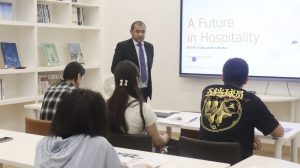The introduction of policies promoting a balance between work and life outside work is an “important” factor for employers seeking to retain staff, namely those workers likely to be exposed to stressful situations in tourism and hospitality roles. That is according to a new academic paper produced by 2 researchers from IFT.
The study aimed better to understand the impact of job stress on retention of staff in Macao’s tourism and hospitality industry. The paper – “The mediating effect of work-family conflict in the relationship between job stress and intent to stay: The case of tourism and hospitality workers in Macau” – was written by Dr. Louis Vong Tze Ngai and Ms. Wendy Tang Sio Lai and was published earlier this year in the Journal of Human Resources in Hospitality and Tourism.
“Work-family conflict poses a particular challenge to tourism and hospitality firms because jobs in this industry share the characteristics of extended working hours, irregular schedules, high turnover, the expectation of working on holidays, split-shifts and unattractive salaries,” the researchers wrote.
Dr. Vong and Ms. Tang suggested that managerial actions to improve employee retention in the industry should go beyond stress-management workshops. Actions should cover work-family conflicts, as these were found by their research to play a mediating role between job stress and employee intention to stay with their employer. The 2 IFT researchers suggested the offering of flexible work arrangements, employee assistance programmes, extended parental leave and facilities to support nursing mothers, as ways to reduce work-family conflicts.
“Despite being practically impossible to eradicate job stress altogether in the workplace, the implementation of family-friendly policies can certainly improve employees’ work–life-balance, which in turn helps mitigate their turnover intention,” the IFT researchers stated.
‘Competitive edge’
They noted some jobs were “inherently stressful”. Accordingly, many stress-management programmes were “less effective” than might in other circumstances be expected, the researchers said.
They added that in situations of high-stress work “family-friendly work practices have become more important than ever because they can lessen the effect of employees’ job stress on his/her other life domains”. The researchers further stated: “Perhaps more importantly, the adoption of work–life balance practices can allow organisations to differentiate themselves as family-friendly employers, thus giving them the competitive edge over their rivals” in attracting and retaining talent.
The study results were based on a survey of 291 respondents. The sample comprised people that reported working in Macao’s tourism and hospitality industry. Approximately 39 percent of the respondents were linked to the wholesale or retail sectors, while around 29 percent were employed in casinos and gaming. Some 14 percent of the respondents reported working in the food and beverage sector, and about 12 percent were employed in the hotel and resort sector. Some 4 percent worked for travel agencies and tour operators. A further 1 percent worked in the meetings, incentives, conferences and exhibitions (MICE) sector, and 1 percent in leisure and entertainment.
“Unlike some Macao-based human resource studies which carried out their investigations against a narrow context such as a specific business category (e.g., hotels or tour operators) or a particular job or profession (e.g., hotel workers or casino dealers), this study was conducted within the larger context of Macao’s tourism and hospitality industry, covering diverse business categories and occupations that are deemed important to the proper functioning of Macao’s tourism business,” the researchers said. “In this respect, this study has revealed a more comprehensive picture of the human resource challenge faced by Macao’s tourism and hospitality workers in general,” they added.
Employee turnover
The researchers noted that hospitality and tourism firms in Macao need to address employee turnover and absenteeism. In view of the fact that “staff retention is fundamental to workforce stability in a tight labour market, it becomes crucial for business enterprises in Macao to improve workforce loyalty and to enhance employees’ desire to stay,” they stated.
Macao’s overall tourism and hospitality industry – as defined by the 2 IFT researchers – provides paid work for approximately half of the city’s employed population, show official data from the Statistics and Census Service for the first quarter of 2017. Macao’s unemployment rate for the period stood at 2.0 percent, a level considered “full employment” by international standards.
Within tourism and hospitality in Macao, the staff turnover rate is particularly high in the food and beverage sector: it stood at 7.1 percent in the third quarter of 2016, the latest available official data. For the hotel sector, it was 5.1 percent in the same period. In wholesale and retail, the turnover rate was 5.6 percent in the fourth quarter of 2016.
“The need to choose between 2 seemingly incompatible demands, i.e., between work and family, has put a working adult under strain,” the IFT researchers wrote in their paper. “When conflicts between work and family have become insurmountable, the only way out is to quit the job,” they added.
The 2 researchers stated that “business organisations have traditionally concentrated their efforts in helping employees tackle stress at the workplace”. They stated: “As this study indicates, job stress has ceased to exert influence on turnover intention once work-family conflict comes into play.”
More info
Ms. Wendy Tang Sio Lai is a Research Assistant at the IFT Tourism Research Centre. She provides support to projects undertaken by the centre. Ms. Tang holds a master’s degree in social sciences with a focus in economics, which was awarded by the University of Macau.









